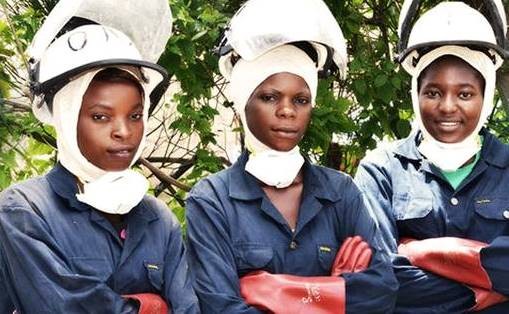
USAID supports Zambia in strengthening its public health system at the national, provincial, and community levels. In collaboration with the Ministry of Health, our activities increase the quality of health care and change attitudes and behaviors, specifically in maternal and child health, family planning, and the prevention and treatment of diseases such as HIV/AIDS, malaria, and tuberculosis. To meet the health-related challenges facing the country, together with partners we develop and encourage programs that reduce infectious diseases, boost nutrition, and promote better family planning. In Zambia, USAID-supported health initiatives include activities that do the following:
SUPPORT HIV/AIDS TREATMENT AND PREVENTION
With an HIV prevalence of 13.3 percent, Zambia benefits from USAID’s assistance, through the United States President’s Emergency Plan for AIDS Relief (PEPFAR) to scale-up integrated prevention, care, and treatment programs, and to lessen the impact of HIV/ AIDS. Under PEPFAR, today more than 720,000 Zambians receive life-saving antiretroviral treatment as compared to 3,500 in 2004, the HIV incidence rate has been cut in half in the last decade, and the infection rate for children born to HIV-infected mothers has dropped from 45 percent to less than 5 percent. Our activities also deliver grassroots-level support to programs offering care and services to over 490,000 orphans and vulnerable children.
Community involvement is essential in preventing the spread of HIV/AIDS at the local level. USAID activities help build the capacity of HIV/AIDS-affected communities to access effective, quality HIV/AIDS prevention services, including counseling and testing, male circumcision, and mother-to-child transmission prevention.
Strong leadership and buy-in by civil society, governmental, religious, and traditional leaders is critical if HIV/AIDS programs are to have a sustainable, scalable, and lasting impact. We actively work with these leaders to create a unified and strengthened response to better public discourse, create stronger policies, and a lower stigma and discrimination associated with HIV/AIDS.
Due to economic, social, and biological inequalities, women are more vulnerable to HIV/AIDS than men. Activities, such as our Prevention, Care, and Treatment Partnership II Bridge, mother-to-child transmission prevention services are available in nearly all facilities that provide antenatal care, which is virtually universal in Zambia. For women living with HIV/AIDS, these services provide care and treatment to maintain their own health, prevent unintended pregnancies, and transmission of the virus to their children. By championing gender equality and promoting internal societal change, we work in combination with other health activities to minimize women’s risk of contracting HIV.
REDUCE MATERNAL, NEONATAL, AND CHILD MORTALITY
The United States Government in partnership with the Government of the Republic of Zambia focuses on rapidly reducing the rates of maternal, neonatal, and child mortality. Through programs, such Saving Mothers, Giving Life, the initiative is expanding to additional districts and is developing partnerships with other donors and agencies to reach over 70 percent of women in Zambia.
STRENGTHEN HEALTH SYSTEMS
Weak healthcare systems erode public confidence and reduce the impact of health programs. we work with the Zambian Government’s Provincial Medical Offices and District Chief Medical Officers to strengthen the local health system through initiatives that improve providers’ management skills and technical capacity. Our health activities also support the Zambian medical supply chain by procuring commodities and ensuring their timely delivery and proper storage.
INCREASE ACCESS TO HEALTH PRODUCTS AND SERVICES
Widespread access to health products and services promote greater use. USAID, through both the private and public sectors, distributes health products and provides services for disease prevention and control. Products and services include: water treatment solution (Clorin), condoms (Maximum and Care), oral contraceptives (SafePlan), and testing, counseling, and male circumcision supplies.
COMBAT MALARIA
With malaria as one of the leading causes of death in sub-Saharan Africa, Zambia is one of 19 countries where the United States President's Malaria Initiative (PMI) operates. PMI partners with the Zambian National Malaria Control Center to support the scale-up of indoor residual spraying, the distribution of insecticide-treated bednets for children and pregnant women, and the provision of rapid diagnostic test kits and life-saving medicines. Through USAID, PMI also procures commodities, provides technical assistance for environmental compliance, and promotes upgraded diagnostic capacity to support the National Malaria Control Center operations.
ENHANCE NUTRITION
Along with better health care services, improved nutrition contributes to a reduction in morbidity and mortality. Activities, such as Thrive, promote healthy nutrition practices for the “first 1,000 days” (pregnancy plus the first two years of a child’s life) and set the stage for proper cognitive and physical development, elevating a child’s ability to be productive in school and eventually the workforce. Our activities help improve the nutritional status of these groups through assessments, counseling, and locally-produced therapeutic food for malnourished patients.
SUPPORT TUBERCULOSIS CONTROL
People infected with HIV are more at risk of tuberculosis, and Zambia’s high prevalence of HIV has contributed to an increase in the number of TB-related cases. Through USAID, the U.S. Government assists Zambia by strengthening tuberculosis control programs, improving detection and treatment by local health professionals through their training and implementation of the latest technologies.
COMBAT GENDER-BASED VIOLENCE
Almost half of all women in Zambia have experienced some form of physical violence. Three USAID-supported activities - Access to Justice, Survivor Support, and Prevention and Advocacy – directly confront the high incidence of Gender Based Violence. In partnership with international donors and local partners, their aim is to mold societal norms towards zero tolerance, enhance protective procedures, and strengthen the institutional environment to prevent and respond to gender based violence and child marriage.








Comment
Make a general inquiry or suggest an improvement.